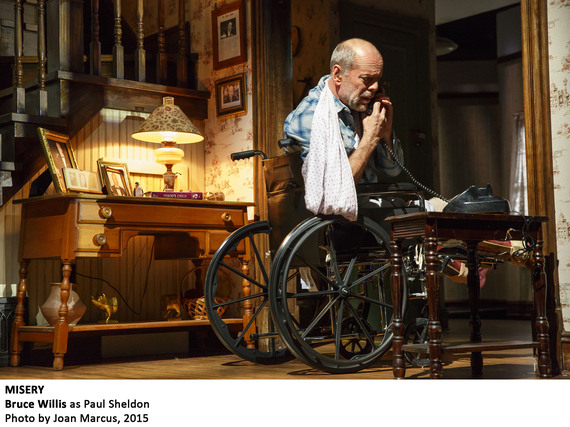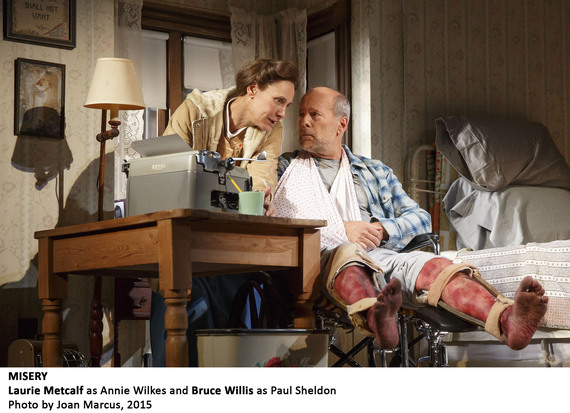Obsession is a dangerous thing. It fills your intestines with knots as you twist and turn trying not to think of someone or something, begging to escape into any other headspace than the one where that someone or something exists. While it's all annoying, really the worst part of obsession is the sting. It hurts, to be so wrapped up and so alone.
This is what Misery brings to light: a culture of obsession, steeped in a long tradition of idolatry. First, we worshipped gods. Now, we pray to celebrities. In a world where most everything is mundane, we grasp onto whatever we find divine and never release it.
Stephen King's 1987 novel has a long legacy with stage and screen. In 1990, Misery took to movie theaters, where Kathy Bates gained notoriety and an Academy Award. The story also lent itself to an off-Broadway play, which has been revived in various iterations. There has even been a Misery musical; how, who knows? So goes our obsession with obsession.
Now, Misery has returned to New York City in a new drama by William Goldman. Bruce Willis plays Paul Sheldon, and Laurie Metcalf is his number one fan, Annie Wilkes. Leon Addison Brown rounds out the cast as a local policeman named Buster.
A quick rundown: Annie follows Paul from his inn at Silver Creek, Colorado, where he's penning his latest book. A snowstorm rolls in, and Paul crashes his car and is left unconscious. Annie takes Paul home under the pretense of nursing him to health while the roads are closed and the telephone lines are down. Meanwhile, she reads Misery's Child, the ninth installment in Paul's series of 19th-century romance novels that spurred her intoxication with him. She does not appreciate the book's denouement and mandates that Paul write another Misery before leaving her cabin. While he types out a tenth episode, she injures and threatens to kill him.
Goldman has made a masterful production. His lines hit hard; they haunt, they jostle. Sometimes, they even make you laugh, a difficult feat when the source material is about kidnapping, torture, and murder. Part of the humor derives from Metcalf, who carries the show. There is no better choice for the role -- she has the psychological depth to reveal sensitive moments even among one of the most cruelly insane characters known to man. As she reads pages of her new Misery volume, she falls onto the bed, sprawling her arms and legs and shrieking with glee. When she honks like a pig, she hints at instability, but also has a certain amiability that inspires a few smiles. And her deadpan line delivery after shooting a man -- "if it's not one thing, it's another" -- is so perfectly timed, it sprinkles a twisted lightness into a scene filled with irony and crushed hope. Indeed, in Metcalf lie a hundred traits that are all too familiar. Maybe you don't have them, but someone you know does, and it's enough to make you shiver.
Willis, on the other hand, is more of a prop than an actor here. His face never expresses much of anything; he's still just Bruce Willis, getting paid to be himself. He seems unbelievable as a writer from the get-go, but most unreal is that he never has a moment of revelation. He sits, captured, at the whim of insanity, and he never seems to realize it. He goes from unknowing to knowing, without a single epiphany etched in his features. His voice stays calm and tempered, too; it's a singsong monotone. Willis could record children's audiobooks, and it would be lovely (I might listen to them as lullabies, too). But here, his ankles are smashed and his penis almost torn off. So where's the heat, where's the intensity?
No review of Misery would be complete without a mention of David Korins' scenic design. Rotating sets have garnered popularity lately, but rarely is one so masterfully devised as Misery's, where you feel like you're looking at a home in rural Colorado, and you see all of its sides so you don't even have to imagine. The energy flow from bedroom to entry to kitchen to outdoors glues itself to reality; you have visited a house like that. Obie winner Michael Friedman's original music is also ghostly and peculiar; he'd do well to make scores for dance -- maybe contemporary ballet -- as his sound has a lot to investigate.
While Misery's plot locks itself into 1987, its themes feel very much of today. Look at what's trending. Choose any day on the 2015 calendar, and see if there isn't some mention of Jennifer Lawrence or one of the Kardashian sisters. We live in a civilization obsessed with celebrity, with placing something on a pedestal and holding it tight. That's the real point of Misery: how if we never let go, it may destroy us.

